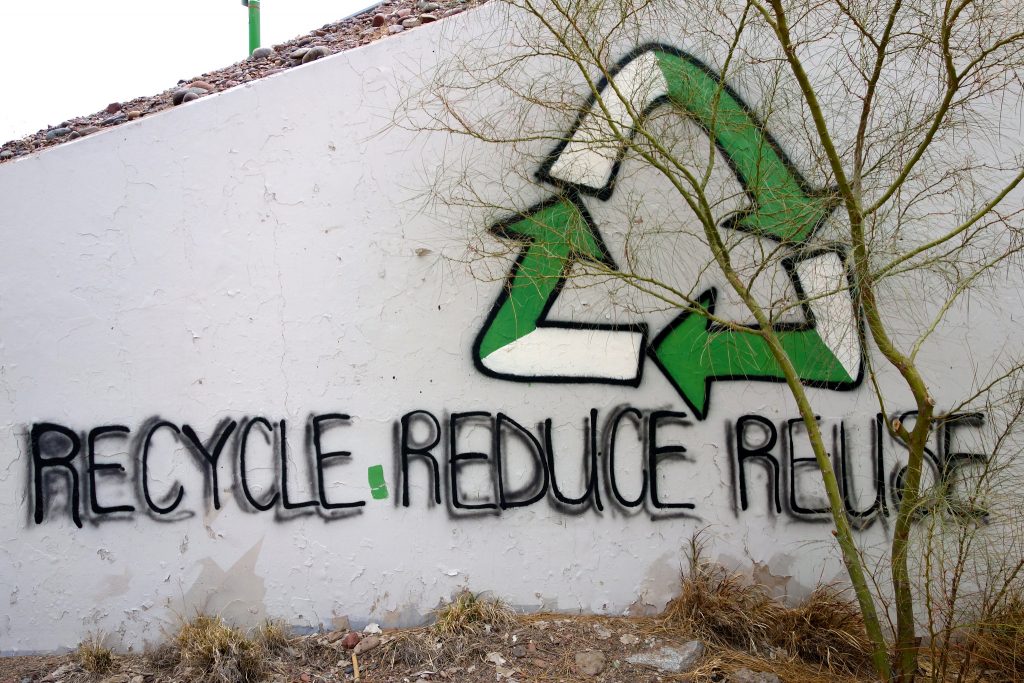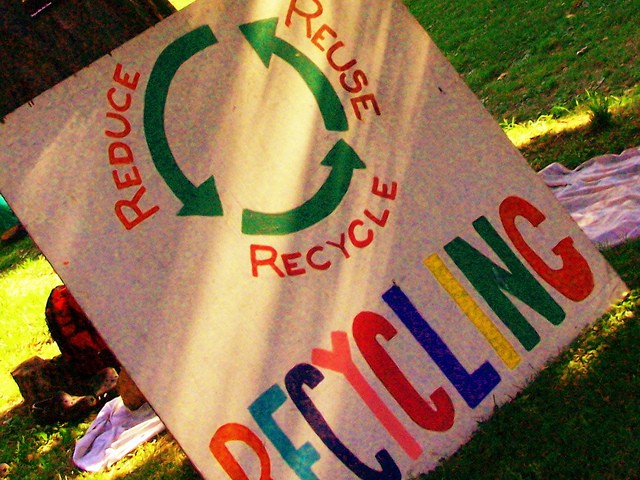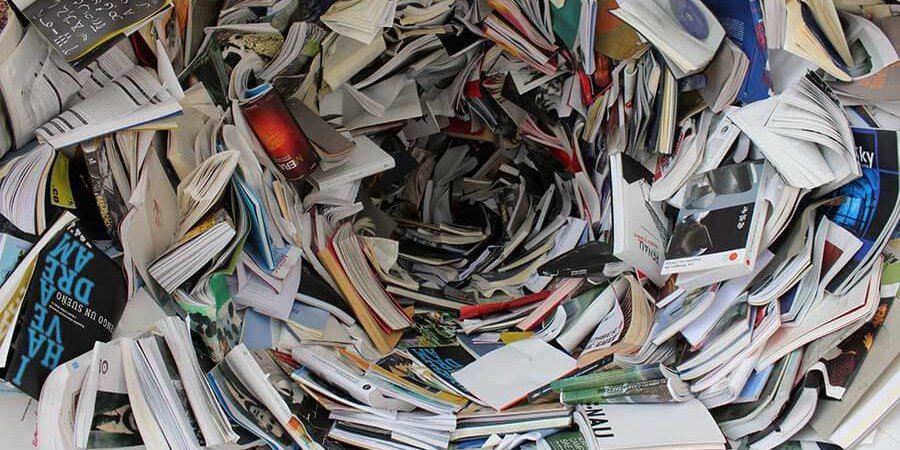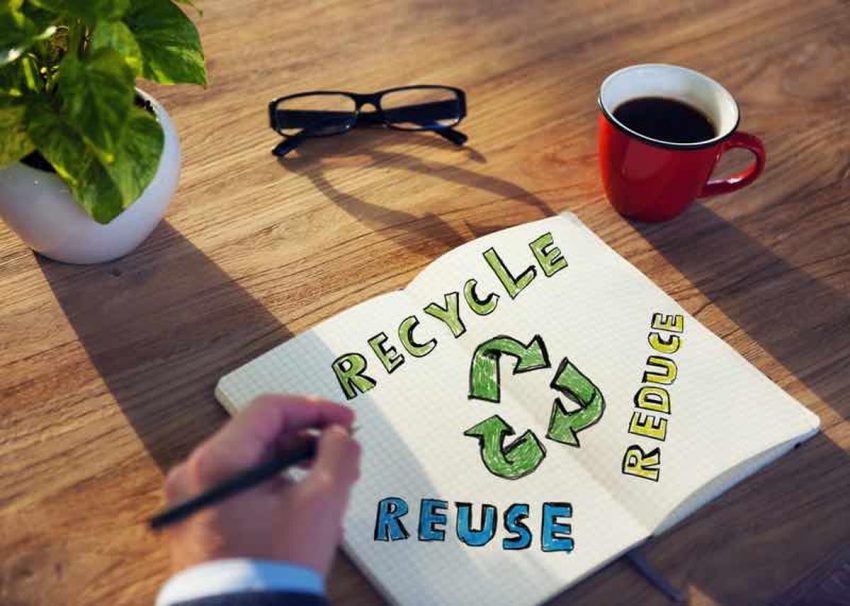Once you start, your mindset will begin to change and before you know it you will start realizing how much you have changed. You will realize how much waste each one of us is capable of creating most of which can be recycled. Any one of these tips alone can make a huge difference for your home and the environment so take a look and get inspired.

1. Plastic bags
The single most effective change you can make towards going green is reduce the use of plastic bags. Purchase two to three reusable bags from a store. Keep them in your car at all times. Also, put some plastic bags from your previous grocery store trips in them in case you need extra bags. Now take them everywhere with you that you shop. Take them to the grocery store, department stores, mall, etc.
2. Plastic Bottles
Right next to plastic bags is plastic bottles. Reduce and eliminate the use of plastic bottles. Use a water filter for home use and there are so many reusable bottles on the market now.
3. Less is More
One of my favorite documentaries is “The story of Stuff”. It talks about where all the stuff comes from that we buy. We have become accustomed to being consumers. Before figuring out whether you can recycle something, how about first stopping to think if you really need this particular product. Will I need it a year from now? Will it end up taking space in the house instead of being useful? Do I absolutely need this?
It is the whole concept of “less is more”. And in the process of not filling your house with “stuff” you really don’t need, you save money for more important things and you are helping the environment by simply making a shift in your way of thinking and not buying all that “stuff” made in china. It is so liberating too not to be tied down to “stuff”.
4. Use Greener cleaners
Most commercial cleaners are not only bad for the environment but for our health. They are poisonous if ingested, harmful if touched or inhaled and greatly contribute towards polluting the indoor quality air. Many of the chemicals found in the commercial cleaners are hormone disruptors, known carcinogens, and cause long-term health damage as well as acute effects such as respiratory irritation, headaches, sneezing, etc. And these same chemicals make it back to our waterways and the cycle continues. There so many options in your grocery store for natural cleaning products that are not harmful. And you can take a step further and formulate your own cleaning products. This may initially sound like a daunting task, but it is so easy. Literally, with baking soda, vinegar, lemons, olive oil, and a few essential oils, you can make all of your cleaning products and it costs pennies over buying the commercial cleaners. Save your cleaning spray bottles and use them to formulate your own formulas. I have written an article that focuses on homemade cleaning product recipes.

Major retailers and companies are happy to recycle electronics and other unusual items. Nike will take back any old shoes, not just their brand and they use them to make school playgrounds. Best Buy will recycle cell phones (they are extremely toxic), and other electronics. There are a number of non-profit organizations that will take computer parts and turn them into working computers for others. Other retailers will gladly take printer cartridges. Recently I sent a whole box of CDs to a company that recycles the covers and the CDs. Most major items can be recycled through a company and you can find what is being recycled simply through a Google search.
6. Buy used items and donate your stuff
Most major cities will have tons of options for consignment stores. This is especially a great idea for children’s clothing store as they grow out of clothes every season. I love shopping at consignment stores for my children as I can buy brand names at a fraction of the cost. Make that extra effort to give away stuff instead of throwing it away. Salvation Army is an easy option to give away your stuff as well as look into your local shelters. Groups like “Freecycle” and “Recycler’s Exchange” exist to help you get rid of useful objects that you just do not want to make use of.
Make it a rule in your house that nothing useable goes in the trash until you have given the community a fair shot at it.
7. Make your home more energy-efficient
There are so many small changes you can make to your home to make a huge difference in your energy bill. Every time your standard bulb goes out, replace it w/ an energy-efficient light bulbs (EE bulbs). It is true that initially the cost of the EE bulbs is more but when you calculate the life of an EE bulbs vs the traditional light bulbs, the EE bulbs cost less over the life cycle. And they use less energy every time you turn it on. Apply weather- stripping to windows and doors and chalk other leaky spots. I have not personally explored solar panels but looking forward to doing that one day.

8. Eat more veggies
Many of the habits we develop to better the environment also ends up being better for us health wise. A meat-centered diet deepens our ecological footprint and contributes to pollution, a plant-centered diet requires fewer resources and supports long-term health. Research shows that vegetarians have lower cholesterol levels, lower blood pressure, and lower rates of hypertension, Type 2 diabetes, and prostate and colon cancer. You do not have to go completely veggie to reap the benefits; try gradually shifting the emphasis of your meals from animal-based proteins to more plant-based foods.
9. Buy recycled products
There are many recycled products on the market now. From toilet paper to printing paper, buying recycled reduces the need to extract virgin materials. Buying recycled toilet paper is great because you are reducing not only tree usage but also chlorine pollution. Using recycled paper products saves manufacturers a trip into the forest and does not require the energy needed to extract pulp from trees. Plus, a four-pack of the recycled kind costs about the same as conventional kind. Support companies that invest in making recycled products, it is your way of voting to tell them that they are making a difference and you care.
10. Be a Green Steward
You as an individual can definitely make a difference by changing your everyday habits. However, you can take a step further and be a green steward for your community. You can help make your child’s school greener. You can start a green initiative in your office or if you have a business, be a role model for other businesses in reducing waste. Companies that are embracing waste reduction not only reduce their overall operational costs but are able to make a difference in much bigger way than at individual levels. So, encourage every business you come across to start a recycling program.
There are tons of other tips not included in the above list like composting, gardening, riding the bus/subway, and supporting environmental organizations that are trying to make a difference. Begin today with what feels important to you and how you would like to contribute most. Begin with what inspires and motivates you the most.
Before you recycle, think about reducing first and adopt a “less is more” attitude. Do you really need that 6th pair of tennis shoes? Think about the buying choices you are making and reduce the consumer habit that we have become so accustomed to. So, the big lesson here is thinking ten times before buying anything, so you do not have to worry about how to dispose it later. And when you do buy something, try exploring used versions like clothes, cars, and books.

